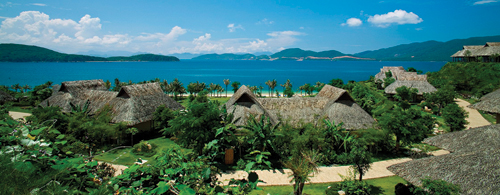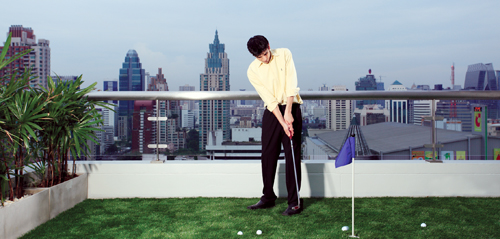Resorts are said to be more popular these days for MICE because people want more playtime even when they meet. Raini Hamdi looks at the ‘bleasure’ phenomenon, a blurring of lines between business with pleasure or leisure, which is forcing meeting organisers and venue providers to look at work-life balance seriously

Best Western Resort & Residences
The quest for work-life balance among today’s road warriors has crept into the meetings sector, where providing wellness to delegates has become a serious thinking point of meeting planners and venue providers instead of an after-thought.
Research by at least three chains shows that ‘bleisure’ or ‘bleasure’ – a mixing or blurring of business with leisure or pleasure – is a real phenomenon.
Hilton HHonors’ survey, for instance, shows one in three UK employees invite partners and families along on business trips, and a high percentage of employers (45 per cent) are sympathetic and supportive of their staff creating their own bleasure stays.
Even Chinese travellers today are “not shy” to mix business with pleasure, a Wyndham Hotel Group survey shows. More than two-thirds of Chinese travellers (67 per cent) say they bring a spouse or a family member along on business trips and 59 per cent extend business trips to include leisure time.
InterContinental Hotels Group (IHG) in South-east Asia notes a 50 per cent rise in bleasure bookings among meeting delegates, who add on a leisure stay pre- or post-meeting.
Not only that, it claims that the bleasure phenomenon is also changing the way people meet: resorts are becoming a more popular destination for business travel and meetings; less time is being spent cooped up in the boardroom (reduced to an average of a day, with as many as two or three days spent in break-out sessions); and more time is being spent on programmes that include working with social and environmental charities.
In fact, IHG said around 25 per cent of enquiries now required at least a half-day be set aside for delegates to enjoy the spa or local excursions.
As a result of these findings, IHG is promoting blue-sky thinking and self-improvement meetings, according to Mark Flower, director of commercial, IHG South-east Asia.
Changing supply
Hotels and venues are rewiring to meet bleasure aspirations, with new properties having a better go at this.
The Crowne Plaza Phuket Panwa Beach Resort, for example, has a meeting room with its very own golf putting green.
The best spaces are also going to meetings, no longer in the basement like before. An example is The Summit, a meeting room at the top of a mountain offered by InterContinental Danang Sun Peninsula Resort.
The design of meeting rooms too is being redefined. The new Pullman Bangkok Silom Hotel G, for instance, has a meeting space called The Gallery, done in a New York-style art gallery. Apart from its conceptual decor and minimalist furnishing, the room offers plenty of daylight and is peppered with iPads for delegates.
“Clients want more flexibility, reactivity, multi-tasking, connectivity, which impacts the interior design and even the service,” said Xavier Louyot, Pullman’s vice president global marketing.
Integrated resorts (IRs) such as Marina Bay Sands (MBS) Singapore see themselves as inherent venues for bleasure, due to the multitude of pleasure options available – spa, entertainment, art, F&B, theatre, casino, etc. And while delegates can enjoy these at leisure, the IRs come up with ideas for groups, such as the Dine Around at MBS, which leverages on the property’s six celebrity chef restaurants. Delegates start with cocktails and canapés at the first restaurant, then move on to subsequent restaurants for starters, mains, desserts and digestifs.
“This allows clients to have a leisurely culinary adventure that they may not normally get to enjoy on their own time,” said John Mims, senior vice president, worldwide sales and resort marketing Asia, Las Vegas Sands Corp.
“Expectations of business travel have changed. More and more, pleasure is a priority than ever before and they expect a higher level of comfort and service while on business. Being seasoned travellers, they also expect to be surprised by new and innovative offerings that they have not come across before in other destinations – comparing, contrasting and making mental notes of what they like,” he said.
Have meetings gone soft?
But does bleasure put meetings in danger of becoming soft, pandering to a desire for more play-time?
Corporate chieftains such as David Levitt, president talent development of Ogilvy & Mather Worldwide, who organised O&M’s Asia-Pacific conference in Kyoto last year, said the success of a meeting still lies fundamentally in how well it has been thought through by the company.
“A lot of meetings follow a formula that is outdated and predictable. Because they lack a real set of tangible, aspirational meeting objectives, some well-thought out theatricality and sufficient investment in the areas that matter, disappointment can set in early.
“There is usually too much input/talking at, top-down, death by powerpoint and long-winded status updates, combined with a lack of real participation (not to be confused with insufficiently planned and thought through break-out sessions). Most meetings also suffer from over-packed, crammed agendas that would benefit from being ruthlessly pruned and focused. And finally, not enough imagination applied to breaks, meals and fun – this is not about cost, it’s about imagination.
“We have learnt the hard way that meetings need to be given a serious amount of careful thought well in advance – not simply because of the cost but to define what their purpose, motivational benefits and value are, and how to be able to sustain the momentum and commitments afterwards. All our significant face-to-face meetings receive a great deal of work in the planning stages.”
That said, Levitt agrees that his meetings are not all work and no play. “There needs to be reward in several forms,” he said. Asked if hotels were pushing the work-life balance too far, he said: “We ourselves are mindful of trying to get this right. I suspect some try to do so more than others, especially if it is a resort location which, by the way, is a pointless location selection by meeting planners if all they intend to do is keep their participants in a windowless meeting room with no time to enjoy the location except for a token dinner by the pool or on the beach.
“We have learnt to seriously think more about the locations we choose, why and how to ensure they are relevant to the meeting’s goals and objectives and the wishes of participants.”
Resorts more popular

Centara Grand & Bangkok Convention Centre at CentralWorld
Meetings in resorts or in resort-like venues are more attractive to participants as they offer various opportunities for pleasure, from swimming to sports to relaxing spas, agrees Monette Iturralde-Hamlin, president and founder, TeamAsia Manila. It is also easier on the organiser as these venues are already set up for pleasure, she added.
“Our experience is that executives are more likely to join business meetings or conventions if there are opportunities for relaxation such as golf or if they can bring their families or partners for some family time before or after the meeting. And, as golf aficionados know, business is conducted on the golf course and important deals closed. Since networking or developing relationships are an important consideration in meetings, providing opportunities for networking in a relaxed atmosphere allows participants to get to know each other better,” she said. – Rosa Ocampo
All meet, no play makes Jack dull
Corporate end-users agree bleasure brings out the best in Jack. They tell TTGmice reporters why and how bleasure changes the way they choose event venues
“Meetings with more pleasure elements are more effective, especially for conferences that run longer than three days. This is an opportunity for busy people to bring their families along. Spouse and children can enjoy themselves in the resort while the delegate attends meetings. There is still quality family time spent, especially at breakfast and dinner. Should the delegate come alone, (he could take the) chance to relax, de-stress and reflect.
“This is why I especially like beach and jungle resorts. If it is a city hotel, it must have flavours of a resort.
“We add the pleasure elements after, not during, meetings, so there’s no concern about having too much (fun). We add spa and massage treatments, or go out to a venue that has good music and a dance floor. Malaysia is still lacking in this area. Bangkok and Singapore have better options.”
Lulie Melling
Congress general, 15th International Peat Congress 2016 in Sarawak, and Tropical Peat Research Laboratory Unit Director, Sarawak Chief Minister’s Office
“Amway hosts incentive trips combining business and pleasure with an aim to foster team spirit and trust.
“In past incentive trips, participants jogged together in scenic Hangzhou, played basketball on a Mediterranean cruise, and so on. This year, there will be incentive trips to Hawaii and Taiwan, combining business sessions and pleasure.
“In addition to business updates and outlook, speakers with weight and appeal add essence to the meeting. Break-out sessions and panel discussions are important, but so are pleasure elements that make participants feel unique and recognised. We have to have the right (content) for meetings and also set aside adequate time for pleasure.”
Louisa Chan
General manager, Amway Hong Kong
“Meetings are definitely more effective when some fun is injected in them.
“Medical meetings are generally informative and educational, so relaxing locations and venues with a different atmosphere or unusual decor will help to lighten the mood. Some hotels also offer all-day coffee breaks, which are welcomed by delegates as they don’t have to stick to fixed coffee break timings.
“However, the quality of service is most important to doctors and medical practitioners, not pleasure elements.”
Rivadee Rattanaruangchote
Office administrator with a medical company in Thailand (company name withheld)



















